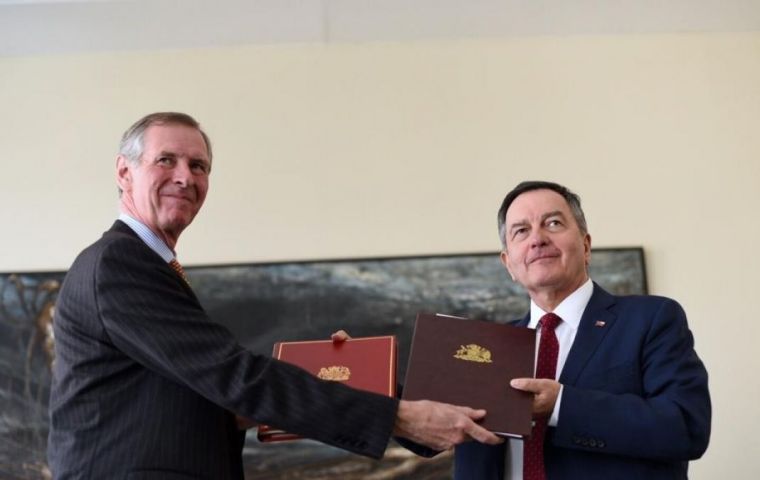MercoPress. South Atlantic News Agency
UK and Chile sign a new trade continuity agreement with post Brexit in mind
 Ambassador to Chile Jamie Bowden and Chilean Foreign Minister Roberto Ampuero stamped the agreement
Ambassador to Chile Jamie Bowden and Chilean Foreign Minister Roberto Ampuero stamped the agreement The United Kingdom and Chile signed on Wednesday in Santiago a trade continuity agreement that will see British businesses and consumers benefitting from preferential trading arrangements with Chile after Britain leaves the European Union. Ambassador to Chile Jamie Bowden and Chilean Foreign Minister Roberto Ampuero stamped the agreement.
The news has been welcomed by the Wine and Spirit Trade Association, which confirmed that this is important to protect parts of the UK’s wine industry, which contributes almost £19 billion to the UK economy supporting around 190,000 jobs.
This trade continuity agreement has been agreed as the UK prepares to leave the EU on 29 March. Other similar agreements are due to be agreed in the coming weeks.
This certainty granted by the agreement will help to further strengthen the trading relationship between the UK and Chile which was worth £1.8 billion and grew by 11% in 2017. UKmanufacturers benefit from preferential access to the Chilean market to sell their goods, and UK consumers benefit from lower prices on Chilean goods, such as wines, fruits and nuts and other products.
Trade in goods and services between the UK and Chile has grown by 9% per year on average since the agreement was provisionally applied in 2003. UK exports to Chile have grown by 16% on average each year and a total increase of 351% since the agreement was provisionally applied.
The agreement also protects intellectual property rights and maintains preferential market access for trade in services. It will also allow British and Chilean companies to bid for some public sector contracts in each other’s countries, helping to create jobs and deliver better value for taxpayers.
Commenting on the event International Trade Secretary Dr. Liam Fox said: “Today we have signed an important trade continuity agreement as we prepare to leave the European Union. This will ensure there is no disruption to British business exporting to Chile after we leave the EU and will mean consumers continue to benefit from low prices and more choice on supermarket shelves.
”Our trading relationship with Chile continues to go from strength to strength, with exports rising over 20% to almost £1 billion last year. This free trade agreement will allow trade to continue as freely as it does currently and will help to strengthen our trading relationship even further.“
Ambassador Jamie Bowden underlined that the UK and Chile enjoy a long-lasting trade relationship. He added that UK is still working to achieve an agreement with the European Union on the terms of the departure and ”the success of those talks will determine whether the current EU-Chile agreement ceases to apply to the UK at the end of March this year, or at the end of an Implementation Period.
“In either scenario, the agreement we have signed today means that there will be no disruption to UK-Chile trade as the UK leaves the EU”.
A spokesperson for the Wine and Spirit Association said that the WSTA welcomes the signing of the UK Government’s continuity trade agreement with Chile. “It is imperative for the UK wine industry that trade with Chile remains undisrupted. In the last 12 months UK consumers bought the equivalent of 105 million bottles of Chilean wine with sales worth some £720 million. That amounts to about 9% of the total UK still wine sales by volume and 8% by value”.
“The agreement avoids unnecessary tariffs which will ultimately save consumers money. Without this agreement tariffs added to wine from Chile coming to the UK would cost industry an estimated £9.2 million”.
The new UK-Chile agreement replicates the existing trading arrangements as far as possible. It will come into effect as soon as the implementation period ends in January 2021, or on 29 March 2019 if the UK leaves the EU without a deal.




Top Comments
Disclaimer & comment rulesCommenting for this story is now closed.
If you have a Facebook account, become a fan and comment on our Facebook Page!